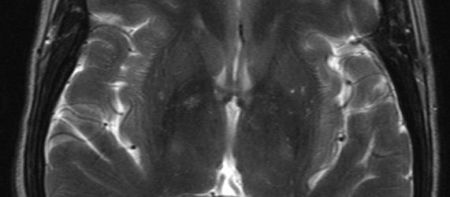A study due to be presented at next week’s annual meeting of the Radiological Society of North America finds that premature birth may trigger developmental processes in the white matter of the brain that could put children at higher risk of problems later in life.
Preterm infants, generally considered as those born 23 to 36 weeks after conception as opposed to the full term normal of a 37 to 42 week pregnancy, are at higher risk of behavioral problems that range from impulsiveness and distractibility to more significant conditions like autism and attention deficit hyperactivity disorder (ADHD).
Stefan Blüml, Ph.D., director of the New Imaging Technology Lab at Children’s Hospital Los Angeles and associate professor of research radiology at the University of Southern California in Los Angeles, explains that there are roughly half a million preterm births in the US each year, of which about 60,000 face an increased risk for significant long-term problems, making this an important issue with enormous costs.
The aim of the study is to learn more about how premature birth might cause changes in brain structure that may be associated with clinical problems observed later in life. The main focus has been on the brain’s white matter, as it acts as the signal transmitter, enabling communication between the brain’s different parts.
Some white matter damage is clearly visible on structural magnetic resonance imaging (MRI), hence in order to look at variations on a microscopic level, Dr. Blüml’s team has been using magnetic resonance spectroscopy (MRS).
The research compared concentrations of certain chemicals associated with mature white matter and gray matter in 51 full-term and 30 preterm infants. The study group showed normal structural MRI findings, whereas the MRS results highlighted major differences in the biochemical maturation of white matter between the term and preterm infants, pointing to an interruption in the timing and synchronization of white and gray matter maturation. Gray matter is the part of the brain responsible for processing and sending out signals.
Commenting on the findings, Dr. Blüml said that in these premature children, the road map of brain development was not seamless as white matter development had an early start and was ‘out of sync’ with gray matter development.
According to Dr. Blüml it was events after birth that were triggering the false start in white matter development, and that the timeline of events in premature kids’ development might be disturbed due to important physiological switches at birth, as well as stimulatory events which happen irrespective of gestational maturity of the newborn.
Dr. Blüml went on to cite the amount of oxygen carried by the blood as the most apparent change, and described the amount of oxygen delivered to the fetus’s developing brain in utero as quite low, which in turn had led to our brains to evolve in order to optimize development in that low oxygen environment. Once born however, infants are quickly exposed to a much more oxygen-rich environment and this drastic change may be something premature brains are not ready for according to Dr. Blüml.
While this change may cause irregularities in white matter development, Dr. Blüml noted that the newborn brain has a remarkable capacity to adapt or even “re-wire” itself—a concept known as plasticity. Plasticity not only allows the brain to acquire new skills over the course of development, like learning to walk and read, but it could also make the brains of preterm infants and young children more responsive to therapeutic interventions, particularly if any abnormalities are identified early.
In conclusion, Dr. Blüml said that the group’s research highlighted the need to enhance the understanding of prematurity’s impact on the timing of critical maturational processes, and subsequently to develop therapies aimed at regulating brain development.
Source: RSNA
26 November 2013
Latest Articles
Brain, MRI, RSNA, MRS
A study due to be presented at next week’s annual meeting of the Radiological Society of North America finds that premature birth may trigger development...



























